Off-grid living is a growing trend as more people seek self-sufficiency, sustainability, and a deeper connection with nature. From remote countryside cabins to eco-friendly urban retreats, living off the grid offers a unique lifestyle that prioritises independence and environmental consciousness. However, embarking on this journey requires more than just a passion for sustainability; understanding and navigating the complex web of off-grid regulations is crucial.
The significance of understanding global off-grid regulations cannot be overstated. Legalities vary widely from one region to another, encompassing everything from land ownership and building permits to environmental and utility regulations. These rules can either facilitate a smooth transition to off-grid living or present significant challenges. Therefore, being well-informed about these regulations is essential for anyone considering an off-grid lifestyle.
This article provides an initial overview of off-grid regulations worldwide. It highlights regional differences and key legal considerations, offering practical tips for navigating these regulations. Whether you’re planning to go off-grid in the UK, Europe, North America, Oceania, or another off-grid hotspot, this guide will equip you with the knowledge to make informed decisions and successfully navigate the legal landscape of off-grid living.
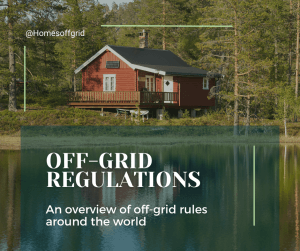
Key Legal Considerations for Off-Grid Living
Transitioning to an off-grid lifestyle involves understanding a range of legal considerations that can significantly impact your plans. Navigating these legalities is vital to ensure a smooth and sustainable off-grid living experience.
Land Ownership and Planning Permission
Securing land for off-grid living is the first and perhaps most critical step. Understanding the nuances of land ownership is key, as regulations vary widely across regions. In many areas, purchasing land comes with specific restrictions regarding its use.
Planning permission is another important aspect. Many regions require permits for building on rural or undeveloped land. This process often involves demonstrating that your off-grid home will not negatively impact the environment or surrounding community. Failure to secure the necessary permissions can lead to legal complications, fines, or even the demolition of structures.
Building Regulations and Permits
Building an off-grid home involves adhering to local building codes and regulations. These rules govern everything from the structural integrity of your home to its energy efficiency and safety standards. Obtaining the necessary building permits is essential, as non-compliance can result in significant legal and financial repercussions. Engaging with local authorities and understanding the specific requirements for off-grid construction in your area is a crucial step.
Environmental Regulations
Environmental regulations are designed to protect natural resources and ensure sustainable development. These laws can affect various aspects of off-grid living, including waste disposal, water usage, and land management practices. Understanding and complying with these regulations is key to avoid legal issues and contribute to environmental preservation. This may involve conducting environmental impact assessments and obtaining special permits for certain activities.
Water and Sanitation
Access to clean water and proper sanitation is fundamental for off-grid living. Regulations regarding water rights and usage can vary significantly. Some areas may require permits for drilling wells or using natural water sources. Sanitation systems, such as septic tanks or composting toilets, must also comply with health and safety standards. Ensuring that your water and sanitation systems meet legal requirements is vital for maintaining a healthy and sustainable off-grid lifestyle.
Energy and Utilities
Generating your own power through renewable energy sources like solar, wind, or hydro is a keystone of off-grid living. However, there are regulations governing the installation and use of these systems. In some regions, you may need permits for solar panels, wind turbines, or other renewable energy installations. Additionally, safety standards for electrical systems must be met to prevent hazards and ensure reliable power supply.
Taxes and Finances
Financial planning for off-grid living includes understanding tax implications and managing expenses. Property taxes, land use taxes, and other financial obligations must be considered. Some regions offer tax incentives for using renewable energy or implementing sustainable practices, which can be beneficial. Keeping detailed financial records and consulting with tax professionals can help you navigate the financial aspects of off-grid living effectively.

By addressing these key legal considerations, you can lay a solid foundation for your off-grid lifestyle, ensuring that your journey towards self-sufficiency complies with legislation.
Practical Tips for Navigating Off-Grid Regulations
Successfully navigating the regulatory landscape for off-grid living requires careful planning, research, and consultation. Here are some practical tips to help you manage the legal considerations involved.
Research and Due Diligence
Thorough research is the foundation of any off-grid project. Understanding the specific regulations and requirements for your area is essential.
- Online Resources: Start by using online resources to gather information about national and local regulations. Government websites, planning portals, and environmental agencies provide a wealth of information. For example, the UK Government Planning Portal offers detailed guidance on planning permission and building regulations.
- Case Studies: Look for case studies and testimonials from others who have successfully transitioned to off-grid living in your area. These can provide practical insights and highlight potential challenges. You may even be able to speak to these people directly and get some first-hand insights.
- Library and Archives: Local libraries and archives can be valuable sources of historical land use and planning information. Understanding the history of your land can help anticipate any legal hurdles.
Consult with Local Authorities
Engaging with local authorities early in your planning process can prevent future issues and ensure your project complies with all necessary regulations from the beginning.
- Pre-Application Meetings: Arrange pre-application meetings with your local planning department. These meetings provide an opportunity to discuss your plans, ask questions, and receive feedback on any potential issues.
- Building Inspectors: Consult with local building inspectors to understand the specific requirements for off-grid structures. Building inspectors can offer guidance on complying with building codes and safety standards.
- Environmental Agencies: Reach out to local environmental agencies to understand any environmental regulations that may apply, such as waste disposal, water usage, and land conservation efforts.
Join Off-Grid Communities
Connecting with off-grid communities can provide support, advice, and valuable resources.
- Online Forums and Groups: Join online forums and social media groups dedicated to off-grid living. These platforms offer a space to ask questions, share experiences, and learn from others who have gone through the process.
- Local Meetups and Workshops: Attend local meetups, workshops, and events focused on sustainable living and off-grid solutions. These gatherings provide opportunities to network and learn from experienced off-grid residents.
- Collaborative Projects: Participate in collaborative projects and community initiatives. Working with others can help you navigate regulations more effectively and build a support network.
Legal Services and Experts
Seeking professional advice can be invaluable when dealing with complex regulations and legal requirements.
- Planning Consultants: Hire a planning consultant who fully understands off-grid living. These professionals can assist with planning applications, navigating local bylaws, and ensuring compliance with national regulations.
- Environmental Lawyers: Consult with environmental lawyers to address any legal concerns related to land use, environmental impact, and resource management.
- Architects and Engineers: Engage architects and engineers who have experience with off-grid projects. Their expertise can help you design compliant, sustainable, and efficient structures.
By conducting thorough research, consulting with authorities, joining off-grid communities, and seeking professional advice, you can successfully navigate the complex regulations associated with off-grid living. This proactive approach will help you avoid legal complications and ensure your off-grid lifestyle is both compliant and sustainable.
Off-Grid Regulations in the UK
Navigating off-grid living in the UK requires understanding both national and local regulations. Each level of government has specific rules and guidelines that can significantly impact your off-grid plans.
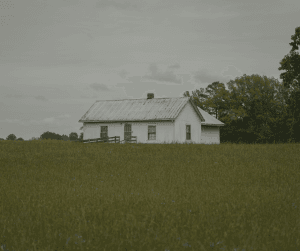
National Regulations
At the national level, several key regulations govern off-grid living in the UK. These include planning permission, building regulations, and environmental laws.
- Planning Permission: The UK government requires planning permission for most types of new developments, including off-grid homes. Planning permission ensures that the construction and use of the property comply with local and national policies, preserving the environment and community standards. You can find more information on the UK Government’s Planning Portal, which provides comprehensive details on the application process, necessary documents, and guidance on permitted development rights.
- Building Regulations: Building regulations in the UK are designed to ensure the health, safety, welfare, and convenience of people in and around buildings. These regulations cover structural integrity, fire safety, energy efficiency, and accessibility. For off-grid homes, compliance with these regulations is mandatory, and failure to adhere can result in fines or legal action. Detailed information can be found on the UK Government’s Building Regulations page.
- Environmental Laws: The UK has stringent environmental regulations to protect natural resources and promote sustainable development. These laws may affect water use, waste management, and the installation of renewable energy systems. For instance, regulations under the Environment Agency govern the use of septic tanks and waste disposal systems, while guidelines from the likes of Natural England or Nature Scot may impact land use and conservation efforts. Additional details can be found on the UK Government’s Environment Agency website.
Some regulations also vary between Scotland, England, Wales and Northern Ireland so ensure you confirm which policies cover your area of choice.
Local Regulations
Local regulations vary by council and can significantly influence your off-grid living plans. Each local authority has its own planning department that handles applications and enforces building codes.
- Local Planning Departments: Local councils in the UK have planning departments that oversee development within their region. These departments ensure that new constructions, including off-grid homes, align with local planning policies and community needs. It’s crucial to consult with your local planning department early in the process to understand specific requirements and obtain necessary approvals. You can find your local planning authority through the Planning Portal’s Local Planning Authority search.
- Specific Local Bylaws: Some areas may have additional bylaws that affect off-grid living. These can include restrictions on building in certain zones, regulations on land use, and specific environmental protections. For example, areas of outstanding natural beauty (AONB) or green belt land often have stricter regulations to preserve natural landscapes. Engaging with your local council and attending community meetings can provide valuable insights into these local bylaws.
Understanding and adhering to both national and local regulations is critical for a successful transition to off-grid living in the UK. By conducting thorough research, consulting with local authorities, and staying informed about legal requirements, you can ensure that your off-grid lifestyle is both compliant and sustainable.
Off-Grid Regulations in Europe
Navigating off-grid regulations in Europe involves understanding the diverse legal frameworks across different regions. Each country has its own set of rules, influenced by its legal system, environmental policies, and local governance structures.
Spain
In Spain, off-grid living is popular in rural areas. Regions like Andalucia and Catalonia are particularly welcoming to off-grid living enthusiasts. The diverse landscapes offer a range of off-grid possibilities, from rustic mountain cabins to coastal eco-retreats.
Building regulations can be strict, so it is essential to secure the correct permissions, especially in areas designated as protected natural spaces. Regulations may vary by region, and consulting local authorities can really help. For specific regulations and permits, consult the local authorities or town halls in the regions where you intend to live off-grid. Additionally, consider contacting Spain’s Ministry for Ecological Transition and Demographic Challenge (MITECO) for guidance on renewable energy and sustainable construction.
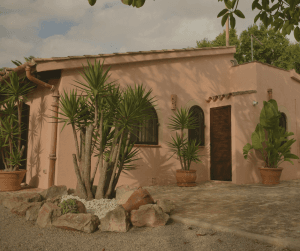
France
France boasts countryside charm and rich agricultural traditions, making it an attractive destination for off-grid living. Rural areas, such as the Dordogne region, have embraced self-sufficiency.
France has relatively flexible rules for off-grid living, particularly in rural and agricultural zones. The French planning system allows for alternative housing structures, but it’s vital to obtain the necessary permits. Local municipalities have significant autonomy in granting permissions. Local authorities, such as the regional prefectures and municipal offices, can provide information on zoning and building permits. The French Ministry of Ecological Transition (MTE) oversees national environmental policies and can guide you on sustainability practices.
Germany
Germany promotes environmental responsibility, making off-grid living an eco-friendly option. The country’s diverse landscapes offer off-grid enthusiasts opportunities for self-sufficiency.
Germany’s rigorous building codes and environmental regulations mean that off-grid projects must be meticulously planned. Check with the local building authorities or Bauamt for permits and regulations specific to your region. Renewable energy systems are encouraged but must meet strict standards. The Federal Ministry for Economic Affairs and Climate Action offers resources on sustainable building practices and energy regulations, while the Federal Ministry for the Environment, Nature Conservation and Nuclear Safety (BMU) can also provide insights into renewable energy policies and sustainable construction practices.
Portugal
Portugal’s sunny climate and welcoming communities make it an attractive destination for off-grid living. Regions like Alentejo and Algarve are known for their support of self-sufficiency and sustainable practices. Portugal is increasingly popular as a destination for people from the UK and other countries looking to start their off-grid journey.
Consult the local municipal offices or câmaras municipais in the regions where you plan to live off-grid for detailed regulations. Portugal’s Directorate-General for Energy and Geology (DGEG) can offer guidance on renewable energy systems.
Bulgaria
Bulgaria’s vast rural landscapes and low population density have allowed it to become increasingly popular as a destination for people from various countries looking to begin their off-grid lifestyle. Local regulations, especially in rural areas, often accommodate self-sufficiency and sustainable living. Land is relatively affordable, and building regulations are less stringent compared to Western Europe.
However, it’s important to navigate Bulgaria’s bureaucracy carefully. Contact the local municipalities or regional offices for building permits and zoning regulations. Bulgaria’s Ministry of Environment and Water can provide information on environmental policies.
Romania
Romania’s traditional farming communities and picturesque rural landscapes make it an appealing destination for off-grid living. Local regulations reflect the importance of revitalising and populating rural regions, with many areas lacking traditional infrastructure.
Building permits are necessary, but there is more flexibility in unincorporated areas. The Romanian Ministry of Development, Public Works, and Administration provides guidelines on building and planning regulations. For specific regulations, reach out to the local councils or town halls in the regions you are interested in. Romania’s Ministry of Agriculture and Rural Development can also provide insights into rural development policies.
Norway
Norway’s stunning fjords and remote landscapes are a dream for off-grid enthusiasts. The country’s strong environmental policies encourage self-sufficiency and sustainable living. While Norway encourages sustainable living, regulations can be strict, particularly in coastal and protected areas. Permits are required for most construction projects.
The Norwegian Directorate for Building Quality is a valuable resource for understanding building regulations. For area-specific information, contact the local municipality or kommune where you plan to live off-grid. Norway’s Ministry of Climate and Environment is also a good resource for renewable energy regulations and policies.
Sweden
Sweden’s expansive forests and tranquil lakes provide ample opportunities for off-grid living. Sweden is a progressive nation, with strong support for renewable energy. Local regulations vary, but many municipalities support sustainable and self-sufficient living.
Building codes are stringent, especially regarding insulation and energy efficiency but you can check with the local kommun or municipal authority in your chosen region for specific regulations. The Swedish National Board of Housing, Building, and Planning provides comprehensive guidelines and the Swedish Energy Agency can offer guidance on renewable energy and sustainability.
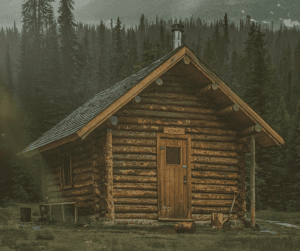
Finland
Finland’s abundant forests and thousands of lakes offer a serene setting for off-grid living. Finland’s building regulations often support self-sufficiency and sustainable practices, with an emphasise on energy efficiency and environmental impact. The Ministry of the Environment, Finland offers guidelines and support for off-grid projects. You can also refer to the local municipality or kunta in your chosen region for specific regulations
Navigating off-grid regulations in Europe requires a thorough understanding of both national and local laws. By consulting relevant authorities and using available resources, you can ensure compliance and make informed decisions about your off-grid living plans.
Off-Grid Regulations in North America
North America offers diverse landscapes and regulatory environments for off-grid living. Both the United States and Canada have complex legal frameworks that include federal, state, and provincial regulations.
United States
The United States provides an extensive canvas for those considering off-grid living. With diverse landscapes and varied climatic conditions, it’s a country where you can find the off-grid conditions that suit you. The regulatory framework is equally diverse, with federal and state-specific regulations that reflect these regional differences.
Federal Regulations: The federal regulations primarily focus on environmental protection and safety standards. Agencies such as the Environmental Protection Agency (EPA) and the Department of Energy (DOE) set guidelines for water quality, waste disposal, and energy efficiency. However, most regulations impacting off-grid living are established at the state or local level.
State-Specific Regulations: The regulatory environment can vary significantly from one state to another. Many states have developed specific regulations related to off-grid living, addressing areas like land use, building codes, and environmental protection. States like Oregon are more off-grid friendly, with policies supporting actions like collecting rainwater as a sustainable water source. In contrast, states like Alabama are more challenging, where stringent regulations and high fees can limit residents’ ability to disconnect from the power grid and implement alternative energy sources.
State government websites provide detailed information on these regulations, for instance:
- California: Known for its stringent environmental laws, California has strict building codes and renewable energy requirements. Off-grid living is possible but requires compliance with detailed regulations, particularly concerning water rights and waste disposal. The California Building Standards Commission provides guidelines and resources.
- Texas: Texas offers more flexibility for off-grid living, especially in rural areas. While building codes are less stringent, it’s still important to understand local zoning laws and water rights. The Texas Commission on Environmental Quality provides information on environmental regulations.
- Colorado: Colorado supports sustainable living with incentives for renewable energy. However, water rights are strictly regulated, and obtaining permits for wells can be challenging. The Colorado Department of Public Health & Environment offers resources on regulations and permits.
Canada
Canada’s diverse landscapes, from the rugged coastlines of British Columbia to the expansive prairies of Alberta, make it an ideal location for off-grid enthusiasts. The country’s federal and provincial regulations ensure a balance between environmental protection and self-sufficient living.
Federal Regulations: In Canada, federal regulations set the overarching standards for environmental protection and building safety so it’s essential to be aware of these federal laws when planning your off-grid lifestyle. Agencies like Environment and Climate Change Canada (ECCC) and Natural Resources Canada (NRCan) provide guidelines on renewable energy and environmental conservation and are valuable resources for understanding federal regulations.
Provincial Regulations: In Canada, provinces and territories have significant autonomy in developing regulations. This means that off-grid regulations can vary widely from one region to another. The Yukon territory is known for supporting alternative building methods and self-sufficient living. Meanwhile, Ontario has more stringent regulations, requiring adherence to various building and environmental codes, which could pose challenges.
Provincial government websites offer in-depth information on these regulations, helping you navigate the legal considerations specific to your region. Here are some examples:
- British Columbia: British Columbia is known for its progressive environmental policies. The province offers incentives for renewable energy but has strict building codes and water rights regulations. The BC Ministry of Municipal Affairs provides information on building and environmental regulations.
- Ontario: Ontario has detailed building codes and supports sustainable living through various programs. However, it’s important to understand local zoning laws and obtain necessary permits. The Ontario Ministry of Municipal Affairs and Housing provides resources and guidelines.
- Quebec: Quebec offers incentives for off-grid living, particularly in rural areas. The province has specific regulations regarding water rights and waste management. The Quebec Ministry of the Environment, the Fight against Climate Change, Wildlife and Parks provides guidelines on environmental regulations and permits.
Off-Grid Regulations in Oceania
Oceania offers vast opportunities for off-grid living. However, navigating the regulatory landscape in these countries requires a clear understanding of both federal and local laws.
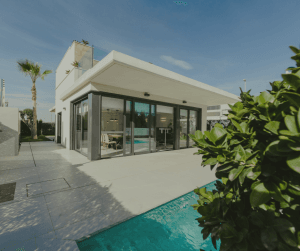
Australia
Federal Regulations: In Australia, federal regulations primarily focus on environmental protection and energy efficiency. The Australian Government encourages renewable energy use and sustainable living practices through various incentives and rebates. Agencies like the Department of the Environment and Energy provide guidelines on sustainable living and renewable energy projects. Key resources include the Australian Government’s Department of Climate Change, Energy, the Environment and Water and the Clean Energy Regulator.
State-Specific Regulations: State-specific regulations in Australia can be intricate and varied but will significantly impact your off-grid living plans. Each state has its own set of rules regarding building codes, land use, and environmental management. To access precise state-specific regulations, you should consult the relevant state or territory government websites.
- New South Wales (NSW): In NSW, planning laws and building codes are administered by the Department of Planning, Industry and Environment. Off-grid living is possible but requires compliance with stringent building standards and environmental regulations. The NSW Planning Portal provides detailed information on regulations and permits.
- Victoria: Victoria supports sustainable living with various programs and incentives. However, it has strict regulations on land use and building codes that must be adhered to. The Victorian Building Authority offers guidelines on building permits and standards.
- Queensland: Queensland has more lenient regulations for off-grid living, particularly in rural areas. However, it’s key to comply with local council regulations and environmental laws. The Queensland Government’s Planning provides resources and information on the building and planning regulations.
New Zealand
With its breathtaking natural landscapes and remote regions, New Zealand offers a compelling destination for off-grid enthusiasts.
National Regulations: National regulations govern environmental protection, building standards, and resource management. These are overseen by the Ministry of Business, Innovation, and Employment. The Resource Management Act (RMA) is the primary legislation that impacts off-grid living, ensuring sustainable management of natural and physical resources. The Ministry for the Environment provides comprehensive guidelines on national regulations and sustainable living practices.
Local Regulations: Local regulations in New Zealand are administered by regional and district councils, which have specific rules regarding land use, building codes, and environmental management. To explore the specific regulations in your area, you should visit the websites of local councils, which offer information on land use and building regulations in a particular region. Here are some examples:
- Auckland: In Auckland, the local council regulates land use and building codes. Off-grid living is subject to strict compliance with local planning and environmental laws. The Auckland Council’s website offers resources and information on regulations and permits.
- Wellington: The Wellington City Council manages regulations related to building codes and land use. Off-grid living requires adherence to local standards and obtaining necessary permits. The Wellington City Council’s website provides guidelines and resources.
- Canterbury: In Canterbury, the regional council oversees environmental regulations, while district councils handle building permits and land use. The Canterbury Regional Council’s website offers detailed information on environmental management and off-grid living requirements.
Navigating the regulations for off-grid living in Oceania is a pivotal step as you explore the unique opportunities these countries provide. To ensure you comply with the latest regulations, consult the appropriate governmental resources at the federal, state or territory, and local levels, enabling a seamless transition into the off-grid lifestyle.
Additional Global Regions
Off-grid living isn’t limited to the more developed areas of the world. Numerous regions across the globe offer opportunities for those seeking a self-sufficient lifestyle, each with its own unique regulatory landscape.
Latin America
Latin America is becoming increasingly popular for off-grid living due to its diverse climates and relatively lenient regulations. Countries like Costa Rica, Mexico, and Ecuador are known for their supportive environments for sustainable living.
Costa Rica: Known for its commitment to environmental sustainability, Costa Rica has policies that encourage renewable energy and self-sufficient living. The government offers various incentives for solar energy and sustainable building practices. The Costa Rican Ministry of Environment and Energy provides detailed information on relevant regulations and incentives.
Mexico: Mexico offers diverse opportunities for off-grid living, particularly in rural areas where regulations can be more flexible. The country has a growing interest in renewable energy, and certain regions offer incentives for solar and wind energy projects. For more information, consult the Secretaría de Energía.
Ecuador: Ecuador is becoming a popular destination for off-grid living due to its rich biodiversity and favorable climate. The country supports sustainable living practices and has regulations that encourage the use of renewable energy. Ecuador’s government offers incentives for solar energy installations and promotes sustainable building techniques through various programs and initiatives. The Ministry of Environment, Water, and Ecological Transition in Ecuador provides comprehensive guidelines and resources on regulations, renewable energy incentives, and sustainable living practices. This support makes Ecuador an attractive option for those looking to live off the grid in harmony with nature. The Guide to Procedures and Services of Ecuador is also useful for reviewing Ecuador’s policies.
Southeast Asia
Southeast Asia presents a unique landscape for off-grid living, with varied regulations across different countries.
Thailand: Thailand has seen a growing interest in off-grid living, supported by government incentives for solar power and sustainable agriculture. Visit Expat Focus for more information and guidelines on building projects and off-grid living.
Philippines: The Philippines, with its numerous islands, offers diverse opportunities for off-grid living. The government promotes renewable energy and self-sufficient living, particularly in rural areas. The Department of Energy offers resources and information on regulations and incentives.
Bali: Bali has emerged as a popular destination for off-grid living, with its stunning landscapes and a growing community of eco-conscious residents. Regulations for off-grid living in Bali vary significantly depending on the specific area and local authorities. It’s essential to work closely with local experts and legal consultants to navigate the regulatory landscape. Visit the Emerhub for more information on Bali.
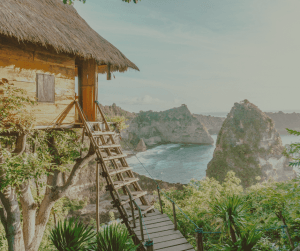
Africa
Several African nations are seeing a rise in off-grid living, driven by the need for energy independence and sustainable living solutions.
South Africa: South Africa has a well-established framework for renewable energy, with numerous initiatives supporting solar and wind power. The country’s energy policies are designed to reduce dependence on the grid, particularly in rural areas. The Department of Mineral Resources and Energy offers resources and guidelines for off-grid energy solutions.
Kenya: Kenya is a leader in Africa for renewable energy, particularly in solar and wind power. The government actively supports off-grid projects to provide energy access in remote areas. The Ministry of Energy provides information on policies and incentives for sustainable living.
Morocco: is gaining attention as a prime location for off-grid living, particularly due to its vast landscapes and sunny climate ideal for solar energy. The Moroccan government has been proactive in promoting renewable energy, with significant investments in solar power through initiatives like the Noor Solar Project. Regulations are supportive of sustainable living, and there are various incentives for installing solar panels and other renewable energy systems. For more information on planning and environmental regulations visit the Baker McKenzie Resource Hub.
Conclusion
Navigating off-grid regulations across the globe presents a complex but rewarding challenge. Each country, state, province, and country can have its own set of rules governing land ownership, building permits, environmental protections, water and sanitation, energy use, and financial considerations. Understanding these regulations is crucial for anyone considering an off-grid lifestyle, ensuring legal compliance and a comfortable off-grid life.
Embarking on an off-grid journey requires thorough research and a proactive approach to understanding and complying with local laws. Engaging with local authorities, joining off-grid communities, and consulting legal experts can provide valuable insights and support. By staying informed and connected, you can navigate the legal landscape more effectively and build a sustainable, self-sufficient lifestyle. Remember, informed planning not only ensures compliance but also enhances the feasibility and enjoyment of off-grid living.
Off-grid living is an evolving field, with regulations continuously adapting to new technologies, environmental considerations, and societal shifts. Staying abreast of these changes is essential for anyone committed to a long-term off-grid lifestyle. As governments worldwide increasingly recognise the benefits of sustainable living, opportunities for off-grid living are likely to expand and improve. By remaining adaptable and informed, you can successfully navigate the dynamic world of off-grid regulations and enjoy the extensive benefits of a self-sufficient, eco-friendly lifestyle.

To find out more about living off-grid return to the Reading Room.


